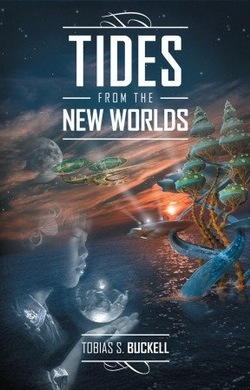Science fiction and fantasy in the West is mostly European in nature. Like it or not, the sensibilities and assumptions of these cultures thread through and underlie most of the SF/F in America and Europe. Go to East Asia and there’s quite a contrast with the West, but we don’t often see that difference here.
We as readers encounter Euro-, and First World-centric literature so often in the genres that it’s easy to forget the existence of a distinctly different point of view. Possible, in fact, to never even taste it.
We forget how much another culture can add to the flavor and texture of stories because we’re most familiar with the ones we grew up with and chanced to read. Tapping into our surrounding cultures for the first time happened when we were younger. Many of us have forgotten that wonder, which is a damned shame, in our field more than in any other, because our genres are the genres of exploration and speculation, reaching beyond the world around us.
In Tides from the New Worlds, Tobias Buckell does what the best SF/F writers do: tells stories that touch our minds with wonder and endow our hearts with perception. Reading this collection, for those of us culture-bound West or East, brings science fiction and fantasy to a fresh awakening. And for those of us who miss seeing ourselves in the fiction we so often read, it’s quite moving.
If an anthology with different writers needs to find a unifying path through its chaotic variety, the true test of a collection from a single writer is the opposite: range.
Some writers work very well at telling certain kinds of stories, and they often tell stories no one else can tell as well, and I do dearly love their work. But the best writers, like the best musicians and composers, are flexible enough to work in many different modes and keys. Stylistic notes—voice and subtle thematic elements—are present, as they would be in any writer’s corpus, but these watermarks don’t restrict the types of stories told. The author still guides the reader through a variety of landscapes, characters, narrative styles, subjects, even genres or sub-genres.
With these considerations in mind, I’m happy to say that Buckell’s Tides from the New Worlds is both a pleasing experience and a memorable read, with the quality I expect to see in an up-and-coming Campbell Award nominee (2007, Ragamuffin). Tides from the New Worlds is the definitive proof that Buckell has both quality and range.
The works included in the collection do include a brush with his space-faring, far-future derring-do (“Shoah Sry” and “Necahual,” the latter of which is actually a sort of coda to Crystal Rain), as well as items I would put up next to Card’s original Ender’s Game series (“All Her Children Fought…” makes me want to pick it up and hug it, like I wanted to hug Ender; and “Anakoinosis” harkens back to the more alien aspects of Xenophile).
But what I love best about Tides from the New Worlds is seeing a more reflective, and arguably more deliciously disturbing, Buckell. There’s a kind of reverse-Wall-E in “Io, Robot”; a perverse imagination in “Her”; mythology with a modern touch in “Death’s Dreadlocks”; a beautiful YA work involving female characters in “Tides”; a strange kind of combination alternate history with past, present, and far-future philosophy in “The Duel”; magical modern-world comedies in “A Green Thumb” and “Smooth Talking”; and more.
Throughout the collection, Buckell introduces each story with information about its context, in terms of his writing career, as well as historical and cultural influences, ideas, and themes he worked with. Many single-author collections kind of just throw all the stories in without much in the way of relevant discussion; this is a refreshing change. An example—and by far not the only one—in Tides from the New Worlds is his discussion of the particularly haunting “Trinkets,” talking about zombies and their Caribbean roots, and combining that with the Haitian slave revolution.
Not every note is hit right, although most are—”Shoah Sry” leaves me a bit cold for some reason, but perhaps that’s just me; and “In the Heart of Kalikuta” could have been more. And while “The Fish Market” is a wonderful opener, I had a stomach punch experience with it. I loved that a poor Asian man was the central character, even with the wonderful Pepper around, and I kept hanging on until the story’s end, painfully, because I knew that, ever since The Good Earth by Pearl S. Buck, we Asians tend to become a morality tale about the dangers of assimilating into a culture not ours. Sometimes it’s just a tangent to the plot and theme of the story, but it’s there.
Well, I both was disappointed and wasn’t disappointed at the same time. It doesn’t really detract, I suppose, and its ending is thankfully more than just the usual morality tale.
Such sour notes, however, are rare. Tides from the New Worlds isn’t perfect, but is still very strong.
The final story, “Toy Planes”, about third-world countries and the fortunes of space, is an ideal closer. I choked up at the final words of this story, which made up for any other little infractions.
Space does and should belong to all of us.
While no ebook version of Tides from the New Worlds exists at the time of this writing, Tobias Buckell was kind enough to send me an ARC—an electronic ARC, an RTF file which I formatted myself to put on my Kindle. Thus I have no comments about ebook formatting.
If an ebook version ever comes out, you can bet I’ll be buying it and dissecting it in the future. I’d love to have an official version, because these stories are quite delectable.










